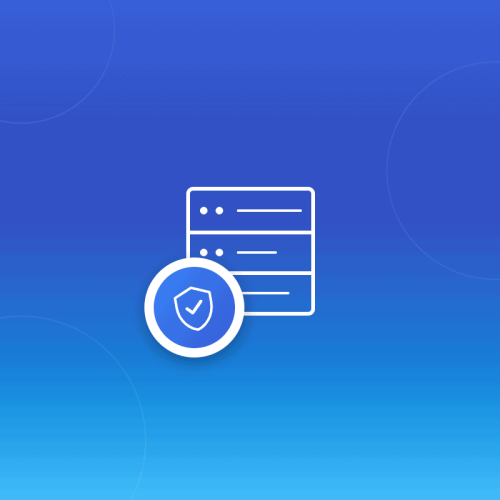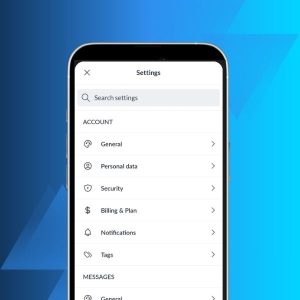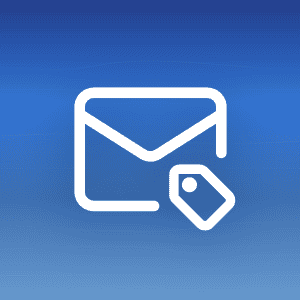What is secure email hosting?
Your emails contain more private information than you might realise. From financial details to personal conversations, your inbox holds sensitive data that deserves better protection than what most free email services offer.
Secure email hosting gives you control over your data with encryption, privacy-first infrastructure, and protection from unauthorised access. Unlike mainstream email providers that scan your messages for advertising, secure email hosting puts your privacy first. You get the email functionality you need without sacrificing your personal information.
This guide explains what makes email hosting truly secure and how to find the best secure email hosting solution for your needs. You’ll learn about encryption methods, hosting infrastructure, and the key features that separate private email from standard webmail. Whether you’re protecting business communications or personal messages, you’ll know exactly what to look for.
Mailfence — Your secure Productivity Suite
Reclaim your Privacy with
- Messages
- Calendars
- Documents
- Groups
What makes email hosting secure?
Secure email hosting protects your messages through three core elements: encryption, privacy-focused infrastructure, and zero-knowledge architecture. Each element plays a different role in keeping your communications private.
Encryption scrambles your messages, so only intended recipients can read them. End-to-end encryption means your emails stay encrypted from the moment you hit send until your recipient opens them. Even the hosting provider can’t read your messages. This is different from transport-layer encryption alone, which only protects emails while they travel between servers.
Your hosting provider’s location and policies matter just as much as encryption. Secure business email hosting typically operates under strict privacy laws like GDPR in Europe. These regulations limit data collection and give you legal rights over your information. The physical location of servers determines which laws protect your data.
Zero-knowledge architecture means your provider can’t access your encrypted data even if they wanted to. You hold the only encryption keys. This design prevents data breaches from exposing your messages and protects you from surveillance requests. Your hosting provider literally cannot hand over your encrypted emails because they can’t decrypt them.
This technical advantage isn’t just theoretical – it’s essential for real-world protection in today’s digital landscape, where email accounts are among the most frequent targets for attackers. With the cost and prevalence of breaches reaching new heights, the stakes for organizations and individuals are higher than ever:
The average cost of a data breach reached $4.44 million globally in 2025, with U.S. organizations facing costs of $10.22 million – the highest ever recorded for any region, according to IBM’s Cost of a Data Breach Report 2025. More than half (53%) of all breaches involve customer personally identifiable information (PII), including email addresses and associated communications.
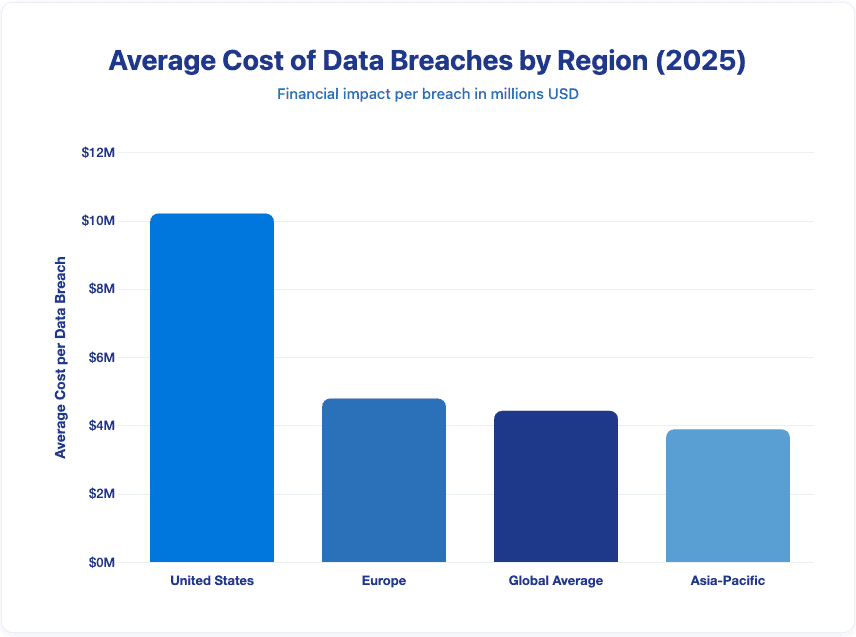
How does secure email hosting work?
Secure email hosting functions differently from free email services at every technical level. Understanding these differences helps you evaluate providers and choose the right solution.
End-to-end encryption
Your device encrypts your messages before they leave for the recipient. The encryption key stays with you, not on the server. This means your hosting provider stores only encrypted data they cannot read.
When you send an email, your client software encrypts it using your recipient’s public key. Only their private key can decrypt the message. This happens automatically in the background. You don’t need to manually encrypt each email or remember complicated passwords for different recipients.
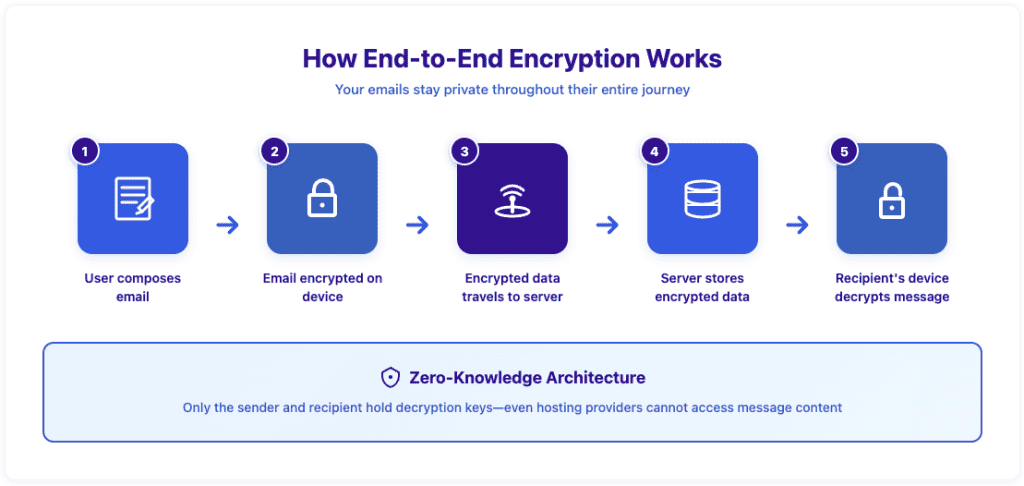
Server-side security
The servers hosting your email need multiple layers of protection. Physical security prevents unauthorised access to hardware. Network security blocks intrusion attempts. Regular security audits identify vulnerabilities before attackers can exploit them.
The servers store your email data on encrypted hard drives. Even if someone physically stole a server, they couldn’t read your messages. Secure enterprise email hosting includes redundant backups stored in different locations. Your emails stay accessible even during hardware failures.
Zero-access architecture
This design principle means your hosting provider builds systems where they cannot access your encrypted data. They store your encrypted emails but don’t hold the decryption keys. You authenticate using your password, which generates the key that decrypts your mailbox.
Your provider can maintain the servers and fix technical issues without ever seeing your email content. This protects your privacy from both external threats and internal access. No employee can read your messages, and surveillance requests cannot force decryption of your stored emails.
Why do you need secure business email hosting?
Your email contains information worth protecting, whether you run a business or manage personal correspondence. Standard email services trade your privacy for convenience, scanning your messages to build advertising profiles.
Business communications often include confidential information like contracts, financial data, client details, and strategic plans. A data breach exposing this information damages your reputation and could violate regulatory requirements. Secure business email hosting protects you from these risks while maintaining professional communication tools.
Healthcare providers, legal firms, and financial advisors face strict confidentiality requirements. Using consumer email services for client communications may violate professional standards or legal obligations. Secure enterprise email hosting gives you the compliance features and audit trails you need.
Yet these risks aren’t just hypothetical – they are driven by a harsh reality, as adversaries grow more sophisticated and relentless each year. Email remains the single most targeted communication channel, with attackers exploiting both technical weaknesses and human error on a massive scale. This is starkly illustrated by the data.
Business Email Compromise (BEC) attacks accounted for 73% of all reported cyber incidents in 2024, representing one of the most financially damaging threats organizations face. These attacks resulted in $2.7 billion in losses in the United States alone during 2024. Furthermore, 94% of organizations fell victim to phishing attacks in 2024, up from 92% in 2023, demonstrating that email remains the primary attack vector for cybercriminals1.
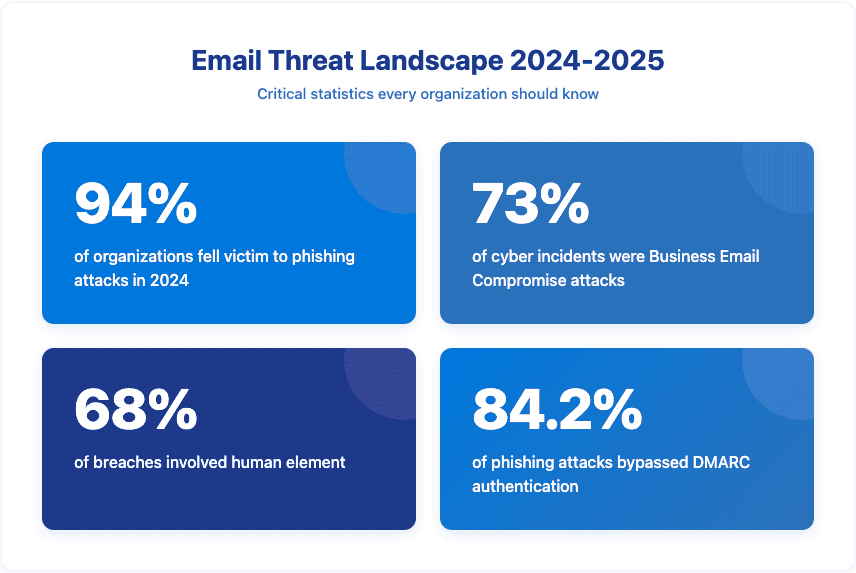
Personal email deserves protection too. Your messages reveal your relationships, health information, financial status, and daily activities. Free email providers collect, analyse, and sometimes sell this data. Switching to secure email hosting reclaims your privacy without giving up email functionality.
Remote work increases email security importance. Your team sends sensitive information from home networks and coffee shops. Secure email hosting protects these messages regardless of where your employees work. You don’t need to worry about unsecured Wi-Fi networks exposing your business data. If you’d like to know, how to implement security measures effectively, follow our detailed business email security best practices guide.
What are the most secure email hosting solutions?
The best secure email providers share several key characteristics, though they differ in specific features and pricing. Here’s how leading solutions compare:
| Provider | Encryption Type | Server Location | Key Features | Best For |
| Mailfence | End-to-end and OpenPGP | Belgium (GDPR) | Full productivity suite, digital signatures, calendar | Business and personal users who want integrated tools |
| ProtonMail | End-to-end | Switzerland | Large user base, simple interface | Individual users prioritising ease of use |
| Tutanota | End-to-end | Germany (GDPR) | Budget-friendly, calendar included | Cost-conscious users needing basic features |
| Posteo | Transport layer | Germany (GDPR) | Anonymous signup, environmental focus | Users who prioritise anonymity |
Mailfence stands out for its complete approach to secure email hosting. You get email, calendar, contacts, and document storage in one encrypted environment. This integration means you don’t need separate tools for different tasks. Your entire workflow stays protected under end-to-end encryption. Plus, you can even set up your own custom email domain.
The platform uses OpenPGP, an open-source encryption standard that security researchers have thoroughly tested. You can communicate securely with anyone who uses PGP encryption, not just other Mailfence users. This interoperability matters when you need to send encrypted emails to clients or partners using different secure email providers.
Digital signatures verify your identity and prove your messages haven’t been tampered with. This feature becomes important for contracts, official communications, and any situation where recipients need to confirm your message is authentic. Mailfence includes digital signatures as a standard feature rather than charging extra.
Belgian privacy laws and GDPR compliance give you strong legal protections. Your data stays in Europe under some of the world’s strictest privacy regulations. Mailfence doesn’t answer to foreign surveillance programmes that might compromise your privacy.
While strong technical and legal safeguards form the foundation of trust, public awareness and confidence in privacy laws also play a crucial role. Despite widespread concern over online privacy, many people remain unsure about how their data is protected. Yet where robust regulations like GDPR are effectively implemented, users consistently report greater comfort in sharing personal information.
A survey of over 1.3 million people revealed that 92% of Americans are concerned about their online privacy, yet only 3% claim to understand how current privacy laws actually work2. Since GDPR implementation, 62% of UK citizens report feeling safer sharing their data3, demonstrating the tangible impact of strong privacy regulations. Organizations that properly protect data see direct business benefits: 94% of companies acknowledge that customers would not buy from them if they didn’t protect data properly.
How to choose the best secure email hosting provider
Selecting your secure email hosting requires evaluating technical features, privacy policies, and practical usability. Don’t let marketing claims distract you from the features that actually matter.
Key features to look for
Start with encryption implementation. End-to-end encryption should be standard, not optional. Check whether the provider uses established encryption protocols like PGP or proprietary systems. Security researchers review open-source encryption, making it more trustworthy than proprietary alternatives.
Look at what data the provider collects. Some secure email services still log your IP address, connection times, and metadata. True privacy-focused hosting minimises data collection to only what’s technically necessary. Read the privacy policy carefully before signing up.
Your hosting provider should support standard email protocols like IMAP and SMTP. This lets you use third-party email clients if you prefer them over webmail. Protocol support also makes migration easier if you decide to switch providers later.
Consider the additional tools included with your email. Calendar integration, contact management, and document storage become more valuable when they share the same security features as your email. Managing separate tools for each function creates more security gaps.
Questions to ask secure email providers
- Where are your servers located? Physical location determines which laws protect your data. European servers generally offer stronger privacy protections than American ones.
- Can you read my emails? The answer should be no. If a provider can read your messages, they can be compelled to hand them over. Zero-knowledge architecture protects you from this risk.
- What happens if I forget my password? Secure providers cannot reset your password and restore access to your encrypted emails. This inconvenience is actually a security feature. It confirms they truly cannot access your data.
- How do you handle legal requests for user data? Look for providers who publish transparency reports showing how they respond to government data requests. This demonstrates their commitment to protecting user privacy.
- Do you support two-factor authentication? This extra security layer protects your account even if someone steals your password. Modern secure email hosting should include 2FA as standard.
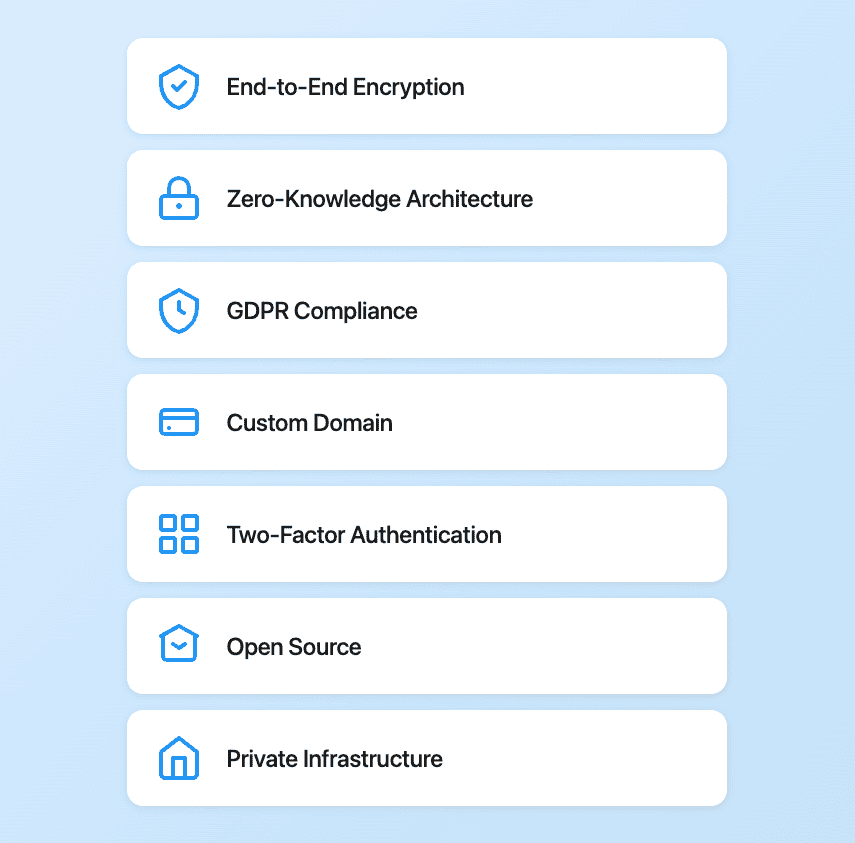
Secure enterprise email hosting vs. consumer email
Enterprise email hosting addresses different needs from individual accounts. Understanding these differences helps you choose the right solution for your organisation.
Business accounts require administrative controls that don’t make sense for personal email. You want to manage multiple user accounts from a central dashboard, set company-wide security policies, and monitor compliance. Secure business email hosting includes these management tools. And for good reason:
The email security market is projected to grow from $5.17 billion in 2025 to $10.68 billion by 2032, reflecting a compound annual growth rate of 10.9%4, driven by increasing cyberattacks and regulatory requirements. Business email compromise losses reached $2.9 billion in 2024, with phishing success rates climbing to 60% as attackers leverage generative AI to craft more convincing emails5.
Storage requirements scale differently for organisations. One user might need 10 GB, but a 50-person company needs 500 GB or more. Enterprise plans offer higher storage limits and better per-user pricing. You get volume discounts that don’t apply to individual accounts.
Integration matters more for business users. Your email needs to work smoothly with project management tools, customer relationship systems, and collaboration platforms. Enterprise secure email hosting offers API access and integration options that consumer accounts skip.
And this is where Mailfence comes in. Mailfence for Business provides scalable plans tailored to your organisation, featuring a secure Productivity Suite with email, documents, calendars, and group management – all designed to keep your data private and protected. We even offer a white label email service!
Key takeaways: Secure email hosting
- Secure email hosting protects your messages with end-to-end encryption that prevents unauthorised access, including by the hosting provider
- Server location determines which privacy laws protect your data, with European hosting generally offering stronger legal protections
- Zero-knowledge architecture means your provider cannot access your encrypted emails even if legally compelled to hand over data
- The best secure email hosting includes integrated tools like calendars and document storage so your entire workflow stays protected
- Enterprise and business users need administrative controls, compliance features, and higher storage limits than personal accounts
- Mailfence delivers end-to-end encryption with a complete productivity suite, keeping your communications and collaboration private
Final thoughts on secure email hosting
Your email privacy depends more on your hosting provider than any other factor. Free email services make money by analysing your messages and selling targeted advertising. Secure email hosting flips this model by charging a small fee to protect your privacy instead of exploiting it.
Making the switch to secure email hosting doesn’t require technical expertise or complicated setup. You get better privacy protection with the same email functionality you’re already using. The transition takes less time than you’d spend organising your inbox, but the privacy benefits last as long as you use the service.
Mailfence offers secure email hosting that respects your privacy while giving you the productivity tools you need. You get encrypted email, calendar, contacts, and document storage in one place. No ads, no tracking, no scanning your messages for marketing data. You can try the service for free and see how secure email hosting works in practice. Not ready yet? Give our monthly newsletter a follow and stay informed about cybersecurity!
Get the latest privacy news in your inbox
Sign up to the Mailfence Newsletter.
Sources:
1 Hoxhunt Business Email Compromise Statistics 2025, Egress Phishing Threat Trends Report 2024
2 Usercentrics Data Privacy Statistics 2025
3 Privacy Engine GDPR Statistics Worldwide 2024
4 Fortune Business Insights Email Security Market Report 2025
5 Mordor Intelligence Cloud-Based Email Security Market 2025
FAQ about secure email hosting
Is secure email hosting really necessary for small businesses?
Yes, small businesses face the same privacy risks as larger organisations, but often have fewer resources to recover from breaches. Secure business email hosting protects client information, financial data, and internal communications from unauthorised access. You get enterprise-grade security at prices small businesses can afford. Your emails likely contain information that competitors would love to access. Customer lists, pricing strategies, and product development plans all flow through email. One compromised account could expose years of sensitive business information.
Can I use secure email hosting with my existing domain?
You can connect your existing domain to most secure email hosting providers. This means you keep your professional email address while gaining better privacy protection. The process involves updating your domain’s DNS records to point to your new email server. Mailfence supports custom domain hosting, letting you maintain your business identity while upgrading security. Your clients see the same email address they’ve always used. The only difference is that your messages now travel through encrypted channels.
How difficult is it to switch to secure email hosting?
Switching to secure email hosting takes less technical knowledge than you might expect. Most providers offer migration tools that copy your existing emails to your new account. The process typically takes a few hours for small accounts, or a few days for large email archives. You can run both email accounts simultaneously during the transition. This gives you time to update your contacts and inform important correspondents about your new secure email address. Many users appreciate having a fresh start with better organised email rather than importing years of old messages.
Does secure email hosting work on mobile devices?
Modern secure email hosting works smoothly on smartphones and tablets. You can access your encrypted email through mobile apps or web browsers. The encryption happens automatically in the background, so using secure email feels the same as regular email from the user’s perspective. Mailfence offers mobile access through webmail that works on any device. Your emails sync across all your devices, so you can start a message on your phone and finish it on your computer. The encryption protects your messages regardless of which device you use.
What’s the difference between secure email hosting and VPN email access?
A VPN encrypts your internet connection but doesn’t encrypt your emails themselves. Your messages still sit unencrypted on your email provider’s servers. Secure email hosting encrypts the emails at rest, protecting them even if someone breaches the server. You can use both together for maximum protection. A VPN hides your browsing from your internet provider, while secure email hosting protects your message content from your email provider. They solve different privacy problems and work well in combination.
